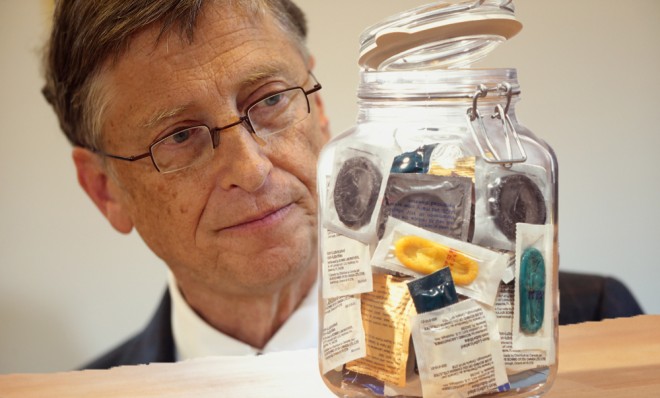Can Bill Gates help build a better condom?
The billionaire philanthropist is searching for a condom that feels better than nothing at all

A free daily email with the biggest news stories of the day – and the best features from TheWeek.com
You are now subscribed
Your newsletter sign-up was successful
Condoms are cheap, plentiful, and very effective at preventing sexually transmitted diseases. So why aren't more people using them?
The Bill & Melinda Gates Foundation has identified at least one problem with the condom:
The primary drawback from the male perspective is that condoms decrease pleasure as compared to no condom, creating a trade-off that many men find unacceptable, particularly given that the decisions about use must be made just prior to intercourse. [Global Challenges]
This is also known as the "but baby, it just feels better" conundrum. The solution? Offer $100,000 — with $1 million in potential funding afterward — to anyone who can come up with a "next-generation condom" that feels as good or even better than going au naturel. That's not exactly a new goal, points out Motherboard's Kelly Bourdet, but while sensation-enhancing gimmicks "may help a brand stand out in a crowded condom aisle, 'fire and ice' gel or whatever else isn't driving people around the world to adopt condom usage en masse."
The Week
Escape your echo chamber. Get the facts behind the news, plus analysis from multiple perspectives.

Sign up for The Week's Free Newsletters
From our morning news briefing to a weekly Good News Newsletter, get the best of The Week delivered directly to your inbox.
From our morning news briefing to a weekly Good News Newsletter, get the best of The Week delivered directly to your inbox.
In fact, condom technology has barely advanced over the last 50 years — the main improvements include switching to latex and improving quality control standards. "There have been attempts to modernize the condom, but none have gone into wide production," writes PopSci's Dan Nosowitz, meaning that "our best tool to fight the spread of sexually-transmitted diseases is basically the finger of a rubber glove."
What the Bill & Melinda Gates Foundation is looking for is some cutting-edge condom technology that incorporates fields like neurobiology and vascular biology. It would also help if the condoms were easier to use and even cheaper than they already are. That would make them more affordable for people in the developing world, which is especially important since, according to the World Health Organization (WHO), one in 20 people in Sub-Saharan Africa are living with HIV.
The idea is to encourage scientists and innovators outside the condom industry to think about the problem. And the big payday is sure to grab their attention.
A free daily email with the biggest news stories of the day – and the best features from TheWeek.com
Keith Wagstaff is a staff writer at TheWeek.com covering politics and current events. He has previously written for such publications as TIME, Details, VICE, and the Village Voice.
-
 The environmental cost of GLP-1s
The environmental cost of GLP-1sThe explainer Producing the drugs is a dirty process
-
 Greenland’s capital becomes ground zero for the country’s diplomatic straits
Greenland’s capital becomes ground zero for the country’s diplomatic straitsIN THE SPOTLIGHT A flurry of new consular activity in Nuuk shows how important Greenland has become to Europeans’ anxiety about American imperialism
-
 ‘This is something that happens all too often’
‘This is something that happens all too often’Instant Opinion Opinion, comment and editorials of the day